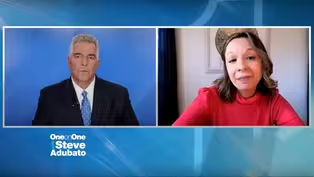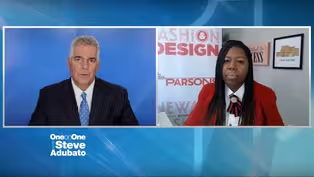One-on-One
NJ Museum's Connection to our Past, Present, and Future
Clip: Season 2023 Episode 2607 | 8m 10sVideo has Closed Captions
NJ Museum's Connection to our Past, Present, and Future
Margaret O’Reilly, Executive Director at New Jersey State Museum, sits down with Steve Adubato to highlight the museum’s connection to our past, present, and future and why viewing art is vital for maintaining a sense of community.
Problems playing video? | Closed Captioning Feedback
Problems playing video? | Closed Captioning Feedback
One-on-One is a local public television program presented by NJ PBS
One-on-One
NJ Museum's Connection to our Past, Present, and Future
Clip: Season 2023 Episode 2607 | 8m 10sVideo has Closed Captions
Margaret O’Reilly, Executive Director at New Jersey State Museum, sits down with Steve Adubato to highlight the museum’s connection to our past, present, and future and why viewing art is vital for maintaining a sense of community.
Problems playing video? | Closed Captioning Feedback
How to Watch One-on-One
One-on-One is available to stream on pbs.org and the free PBS App, available on iPhone, Apple TV, Android TV, Android smartphones, Amazon Fire TV, Amazon Fire Tablet, Roku, Samsung Smart TV, and Vizio.
Providing Support for PBS.org
Learn Moreabout PBS online sponsorship(upbeat music) - We're now joined by Margaret O'Reilly, Executive Director of the New Jersey State Museum.
Margaret, good to see you.
- Good to see you too, Steve.
- Tell folks why museums, particularly the state museum in beautiful Trenton, New Jersey, our state capital, why museums matter now more than ever in 2023?
- Well, you know, museums collect our past and preserve that past and tell us about the present day and imagine the future.
And they're places that dialogues happen.
They've been proven to make us healthier.
People who attend museums are healthier.
You have a better quality of life if you attend museums.
So they're really important, integral to our day-to-day lives.
- Explain that a little bit.
I'm around the corner from the Montclair Art Museum.
Do not go there enough.
Should go there more.
I go there and I feel better.
Why?
Explain that a little bit more so people understand.
- Because you know, I think that you connect with, you connect with yourself first of all, if you're looking at art, let's talk about art.
That's my area of expertise and that's what Montclair has.
You get a sense of wellbeing by looking at art.
It makes you calmer or it makes you think or it makes you engage in your community in a one-on-one way with a piece of art.
You're having a dialogue with a piece of art.
And I think it takes you outside of yourself and all those other worries and fears can just melt away.
- Now you've been in the museum business you've been at the State Museum 35 years.
- 35 years in May, yeah.
- First of all, congratulations.
- Thank you.
- And thank you for your service to the state.
- It's the best job in the state.
But don't tell the governor.
- Well, of course, but you want that check every two weeks.
Sometimes I make the mistake of saying I love my job so much, I can't believe I get paid.
Which is not a smart thing to say.
- Right.
- So I wanna be clear on this.
I have passion for what I do and I've expressed that enough, more times than people want.
Why do you have passion for what you do?
- You know, I got into this business because I was an artist and I started at the museum as the graphic designer here, and was trained along the way by people who knew my love of art.
And I was also trained as a painter.
And I think I've stayed because every day I learned something new.
I work with very passionate people.
You know, we're not just art curators here.
We're scientists and historians and archeologists.
And I learn something from them every day.
And when I walk through the galleries I can see the result of our work in the interactions that people are having with the artifacts on view.
It's extraordinary.
It's an extraordinary business to be in.
- I'm curious about this three years plus into the pandemic.
All of us who are heads of organizations, particularly not-for-profits.
Now are you a state, I wanna be clear on this.
Are you state entity, agency?
- We are a state agency, yes we are.
- With funding directly from the state budget.
- Yes, we get an appropriation from the state budget.
And we also have a non-government 501C3 organization, the New Jersey State Museum Foundation that helps us fundraise from folks who can't give money to government entities.
- Okay.
So during these three years plus in the pandemic the level of state funding stayed the same, did you get some of the federal money?
Talk to us.
- Yes, we got a little bit of federal money and of course we were shut down.
So we needed every penny of that appropriation to retool our operation.
We are an onsite service organization, obviously.
People come to museums.
So how do you serve entities when you can't come here anymore?
So we had to use that state appropriation to buy equipment to do video programs to do digital interactions with our visitors, to photograph some things that had never been photographed so we could share them with the public.
So that appropriation kept us going and kept our staff employed.
- Now, you talked about museums being connected to the past but museums when they're really good, yours is, also connects us to the culture that we're living in.
The Me Too movement, the Black Lives Matter movement.
How has the state museum connected to those movements which are so integral to our culture today and the very near future and beyond?
- Certainly our exhibitions try to be relevant.
So whatever topic we might be presenting we want to make sure that people see themselves in those exhibits.
It's not Margaret O'Reilly's voice in those exhibits.
It's the voice of the makers of the art, of the history that's happened in any given time.
So we wanna make people feel present and connected to what they're seeing on view here and in our programming as well.
- So I wanna be clear, it's so interesting, I talk to our producers all the time about this.
We have a lot of comedians we're interviewing today and a lot of artists and musicians.
And I think to myself, is it our job to select exhibits, guests, whatever?
And I'm not saying our work is as important as yours but there are exhibits you have that sometimes you're not a fan of, that you may not be connected to.
But our job is to ask ourselves, how do we connect to different parts of the community even if it's not something I relate to.
Am I making too much of that?
- No, no, you're absolutely right.
There are things that, and again, I'll go back to art 'cause that's my wheelhouse.
There's art that I love and there's art that intellectually I understand and I know why it's important and I know why it'll be relevant to communities, but it wouldn't be the thing I'd put necessarily in my home.
But that's important for me to show I'm a professional and we all have to do that here.
We go beyond what interests us.
It might start with what interests us, but then we go beyond that.
- Right.
Yeah, it's too narrow what interests some of us.
- Yeah, absolutely.
- Real quick, children and museums talk about that experience.
How young is too young and why is it so important?
- No, you know, no age is too young.
We have young learners programs from age six months to five years because those are the museum goers of the future.
So we wanna certainly start them early get them to understand this cultural experience.
'Cause for a lot of our young visitors we're their very first cultural experience.
They come here on a school trip or their folks bring them from one of the neighborhoods in to visit us.
So we want them to be comfortable here, feel like this is their place.
It's a place where they can learn, where they can have fun.
You can have fun at museums.
People think that we're stayed, but we're not.
- And real quick before I let you go what's the Small Explorers Program?
What is that real quick?
30 seconds.
- Small Explorers is our partner program with the PNC Foundation.
They've been funding that for more than five years now.
That helps young learners.
That's one of our major initiatives that's been going on for years.
Again, to teach them about culture, to teach them about going to museums.
To teach in literacy - Museums matter.
You just heard that from... - They absolutely do Steve.
- They do.
Margaret O'Reilly, Executive Director of the New Jersey State Museum.
The website had been up, has been up.
You can find out more about the state museum.
Margaret, wish you on all your colleagues at the State museum all the best.
Thanks so much for your service.
- Thanks so much Steve.
Appreciate talking to you today.
- You gotta stay with us.
We'll be right back.
- [Narrator] One-On-One with Steve Adubato has been a production of the Caucus Educational Corporation.
Funding has been provided by The Turrell Fund, supporting Reimagine Childcare.
NJM Insurance Group.
PNC, Grow Up Great.
PSEG Foundation.
PSE&G, New Jersey Sharing Network.
The North Ward Center.
The Port Authority of New York and New Jersey.
And by Community FoodBank of New Jersey.
Promotional support provided by NJBIZ.
And by New Jersey Globe.
How do you create change?
By cultivating hope.
And we see that every day, in the eyes of our preschoolers, in the souls of the seniors in our adult day program, in the minds of the students at Robert Treat Academy, a national blue ribbon school of excellence, in the passion of children in our youth leadership development program, in our commitment to connections at the Center for Autism, and in the heart of our community, the North Ward Center, creating opportunities for equity, education, and growth.
COVID's Mental Impact on Parents and Their Children
Video has Closed Captions
Clip: S2023 Ep2607 | 9m 10s | COVID's Mental Impact on Parents and Their Children (9m 10s)
Creating Inclusive Fashion With a Purpose
Video has Closed Captions
Clip: S2023 Ep2607 | 11m 10s | Creating Inclusive Fashion With a Purpose (11m 10s)
Providing Support for PBS.org
Learn Moreabout PBS online sponsorship
- News and Public Affairs

Top journalists deliver compelling original analysis of the hour's headlines.

- News and Public Affairs

FRONTLINE is investigative journalism that questions, explains and changes our world.












Support for PBS provided by:
One-on-One is a local public television program presented by NJ PBS

